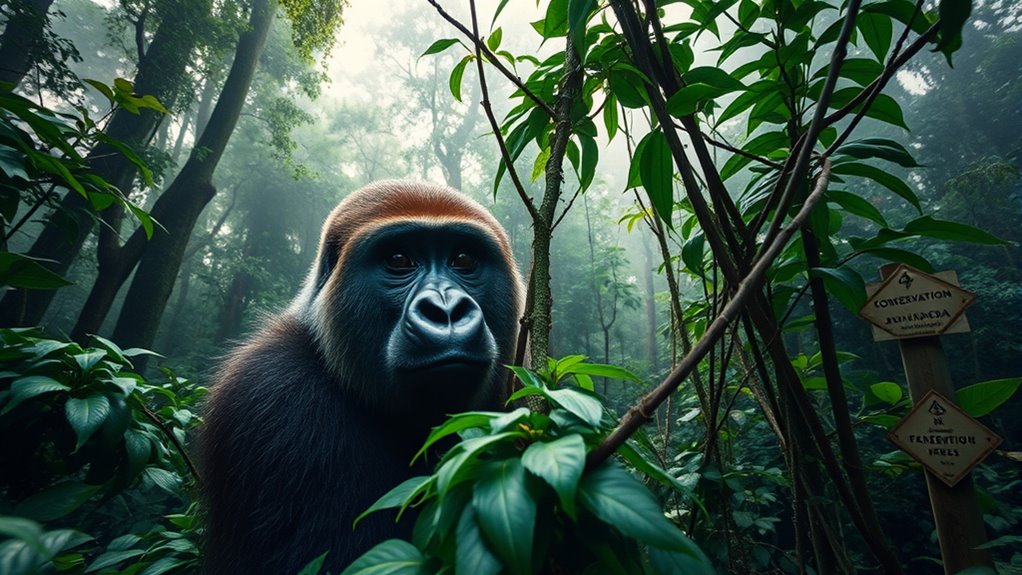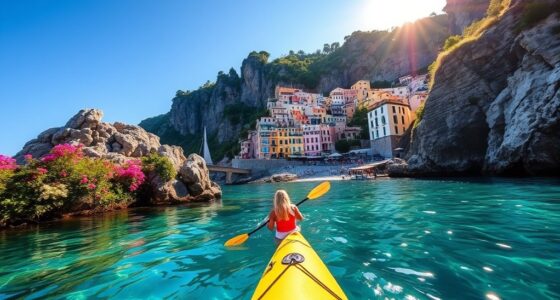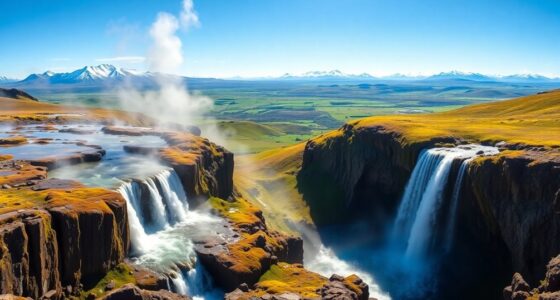Rwanda’s gorilla trekking permits play a crucial role in conservation by funding habitat protection, anti-poaching efforts, and community projects. They help control tourism to prevent habitat damage and guarantee gorillas aren’t disturbed. Securing a permit involves applying early through authorized operators, supporting sustainability, and understanding the importance of responsible tourism. If you want to learn more about how these permits support long-term gorilla preservation and eco-tourism, keep exploring further advantages and strategies.
Key Takeaways
- Gorilla permits in Rwanda are limited and require advance booking through authorized operators to support sustainable tourism and conservation efforts.
- Purchase of permits generates vital revenue that funds anti-poaching, habitat restoration, and community development initiatives.
- Permitting controls tourism numbers, minimizing habitat disturbance and ensuring gorilla groups are not overstressed or disrupted.
- Responsible trekking practices and eco-friendly gear help reduce environmental impact and support long-term habitat preservation.
- International funding, research, and community involvement are essential strategies for maintaining healthy gorilla populations and protected habitats.
The Significance of Gorilla Permits in Rwanda

Gorilla permits in Rwanda play a crucial role in guaranteeing that conservation efforts are sustainable and effective. By controlling access through permits, authorities help protect the delicate gorilla habitat from over-tourism, ensuring the ecosystem remains healthy. These permits regulate trekking activities, enforcing strict regulations that minimize disturbance to the gorillas and their environment. When you acquire a permit, you contribute directly to the preservation of these majestic animals and their natural habitat. The trekking regulations associated with permits ensure that visitors follow guidelines, such as limiting group sizes and maintaining a respectful distance. This balance allows you to enjoy an unforgettable experience while supporting long-term conservation, safeguarding Rwanda’s gorillas for future generations. Additionally, implementing visitor management strategies helps reduce environmental impact and ensures the sustainability of gorilla tourism.
How Permits Support Conservation Efforts
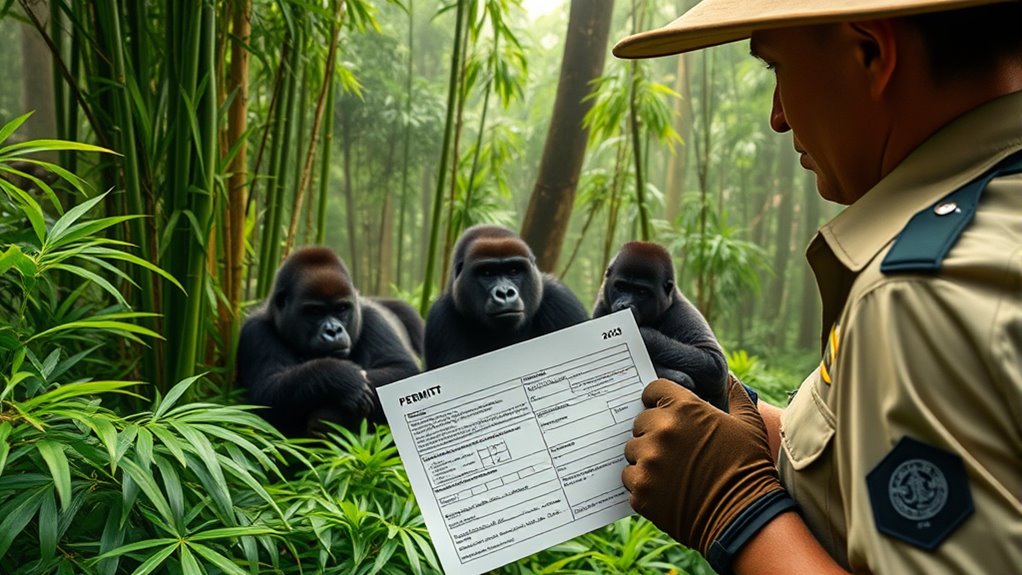
By securing a permit, you directly support conservation initiatives that protect Rwanda’s gorillas and their habitat. Eco tourism benefits from your participation by generating essential funds that fund anti-poaching patrols, habitat restoration, and research projects. These efforts help guarantee that gorillas have a safe, thriving environment to live in. Your permit fee contributes to habitat protection, reducing illegal activities like poaching and deforestation that threaten these majestic creatures. When you visit responsibly, you’re not just enjoying an unforgettable experience—you’re actively helping to preserve the biodiversity of Rwanda’s forests. This sustainable approach balances tourism with conservation, ensuring future generations can also witness the wonder of gorillas in their natural habitat. Additionally, implementing robust security measures can significantly mitigate the risks of illegal activities such as poaching and habitat destruction. Your support truly makes a difference in safeguarding these incredible animals.
The Permitting Process and How to Secure Your Ticket
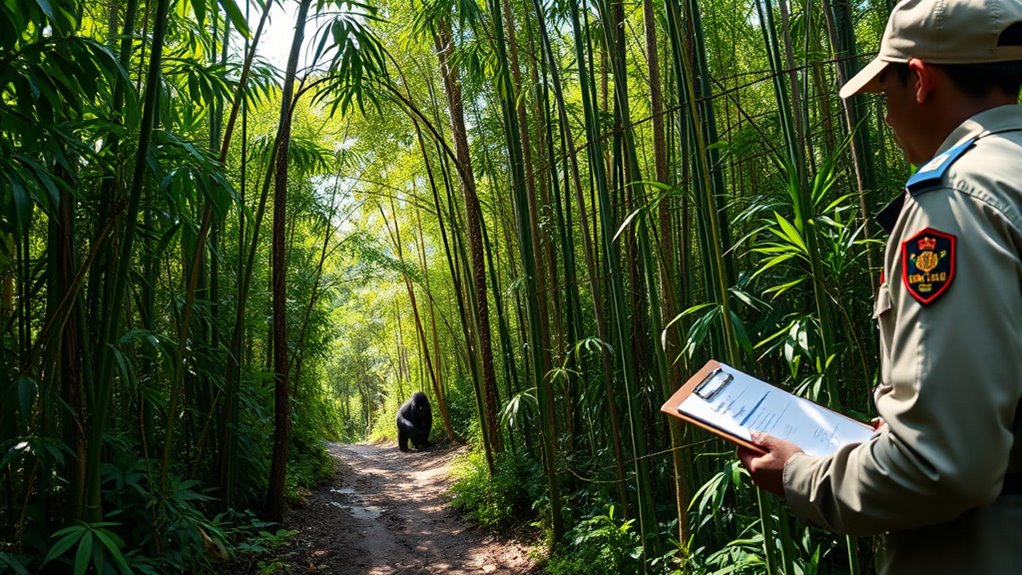
Securing a permit for gorilla trekking in Rwanda involves a straightforward process that requires some planning ahead. First, you need to submit a permit application through authorized tour operators or directly via the Rwanda Development Board. It’s best to apply well in advance, as permits are limited and in high demand, especially during peak season. Once your permit application is approved, you’ll receive your official gorilla tracking permit, which confirms your spot for the trek. The permit details the date, time, and location of your activity. Keep in mind that permit prices are fixed, and purchasing through a reputable operator guarantees all arrangements are smooth. Securing your permit early guarantees a memorable gorilla tracking experience in Rwanda’s pristine habitats. Additionally, understanding the SWIFT/BIC codes used in financial transactions can facilitate smooth payments for your permits and related expenses.
Impact of Tourism on Gorilla Population and Habitat
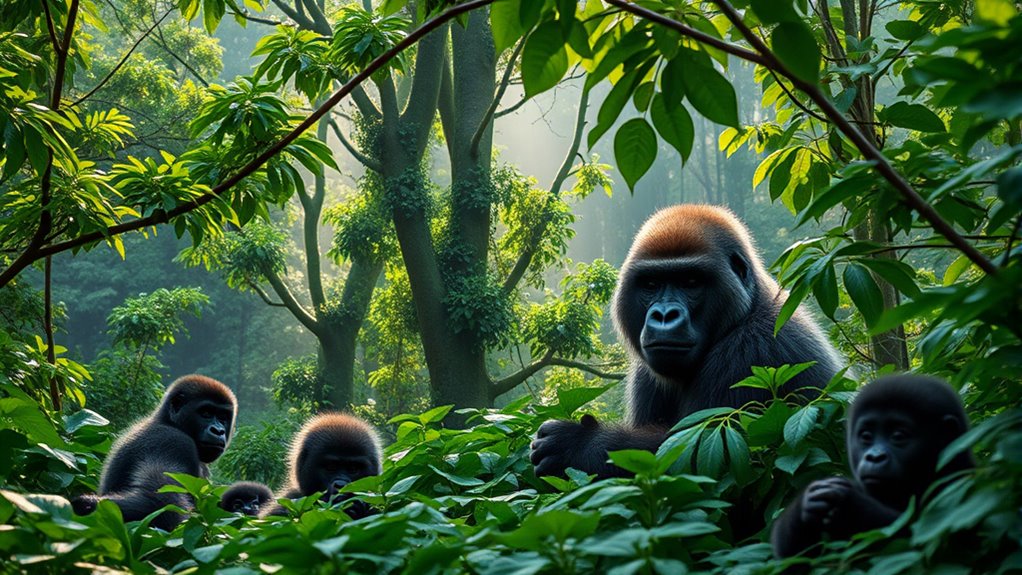
Tourism has substantially increased awareness and support for gorilla conservation, but it also poses challenges to their populations and habitats. Increased foot traffic can disturb gorilla behavior and disrupt their natural routines, affecting their health and social structures. Visitors often come to see gorillas during their daily activities, which can interfere with their natural foraging, especially since the gorilla diet depends heavily on specific forest plants. Excessive tourism can lead to habitat degradation, impacting the forest ecology that gorillas rely on for food and shelter. Managing visitor numbers and maintaining strict guidelines are essential to minimizing these impacts. Additionally, understanding the importance of market trends in tourism can help develop sustainable strategies that balance conservation efforts with visitor interest. By understanding these challenges, you can appreciate the importance of sustainable tourism practices that protect both the gorilla populations and their indispensable habitat.
Community Involvement and Socioeconomic Benefits
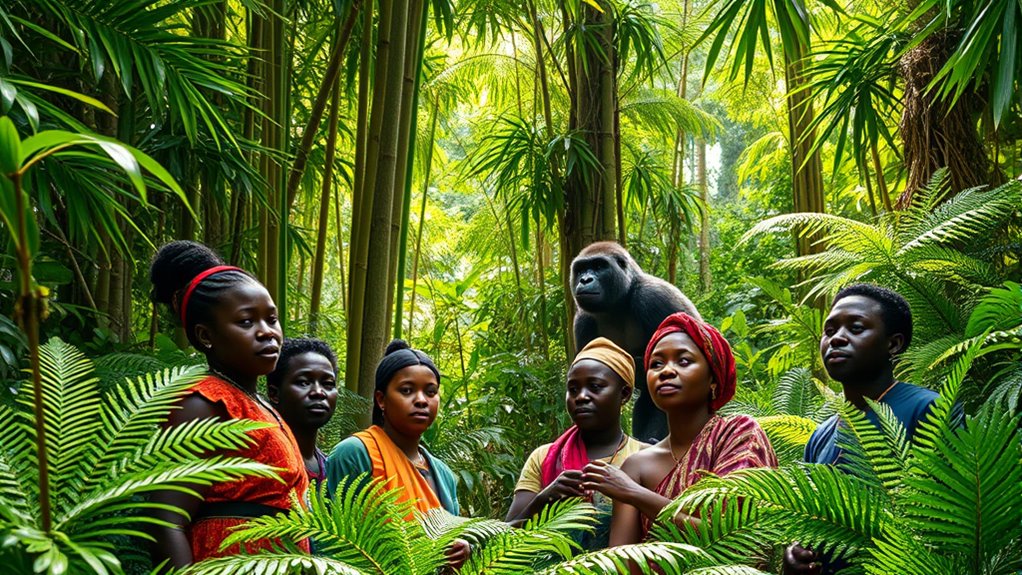
When you visit Rwanda for gorilla trekking, you directly support local employment opportunities and community projects. The revenue generated helps fund initiatives that preserve cultural traditions and improve residents’ quality of life. By engaging with these efforts, you contribute to a sustainable future for both the community and the gorillas. Additionally, promoting community involvement in conservation efforts ensures lasting positive impacts for future generations.
Local Employment Opportunities
Community involvement plays a vital role in gorilla trekking in Rwanda, creating valuable employment opportunities for local residents. These roles support sustainable tourism and boost the local economy. Engaging community members in conservation efforts helps ensure the long-term protection of gorilla habitats while providing economic benefits. Here are three key ways you can see this impact:
- Guiding services for tourists, providing jobs for trained local guides.
- Hospitality and accommodation roles in lodges and hotels.
- Conservation efforts involving community members in habitat protection.
Revenue for Community Projects
Revenue generated from gorilla trekking permits directly funds various community projects, helping improve local infrastructure, healthcare, and education. These eco-tourism benefits empower communities by providing sustainable income sources, reducing reliance on harmful practices like poaching. The funds also support wildlife monitoring efforts, ensuring the continued protection of gorillas and their habitat. As a result, local residents see a direct link between conservation and socioeconomic development, motivating their involvement. Community projects funded by permit revenue often include building schools, clinics, and roads, which improve daily life. This approach fosters a sense of ownership and pride among residents, encouraging ongoing conservation efforts. Overall, the revenue from permits plays a crucial role in strengthening community resilience and promoting sustainable coexistence with Rwanda’s rich biodiversity. Additionally, by integrating positive thinking strategies, local communities can enhance their outlook and resilience, further supporting conservation initiatives and socioeconomic growth.
Cultural Preservation Initiatives
Cultural preservation initiatives in Rwanda’s gorilla tourism efforts actively involve local communities, ensuring their traditions and customs remain integral to the conservation process. By participating in these programs, you help sustain cultural heritage through activities like traditional dances and sacred rituals. These initiatives promote community pride and foster respectful engagement with visitors. Incorporating authentic vintage decor and cultural symbols into community activities can further enhance the preservation of local traditions. Key ways you can contribute include: 1. Participating in or supporting traditional dance performances that showcase local history. 2. Respecting sacred rituals and cultural sites as part of conservation efforts. 3. Promoting awareness of the cultural significance of gorillas and local customs. Your involvement helps preserve Rwanda’s rich heritage while supporting sustainable tourism. This synergy strengthens community bonds and enhances the overall conservation success.
Sustainable Practices in Gorilla Trekking
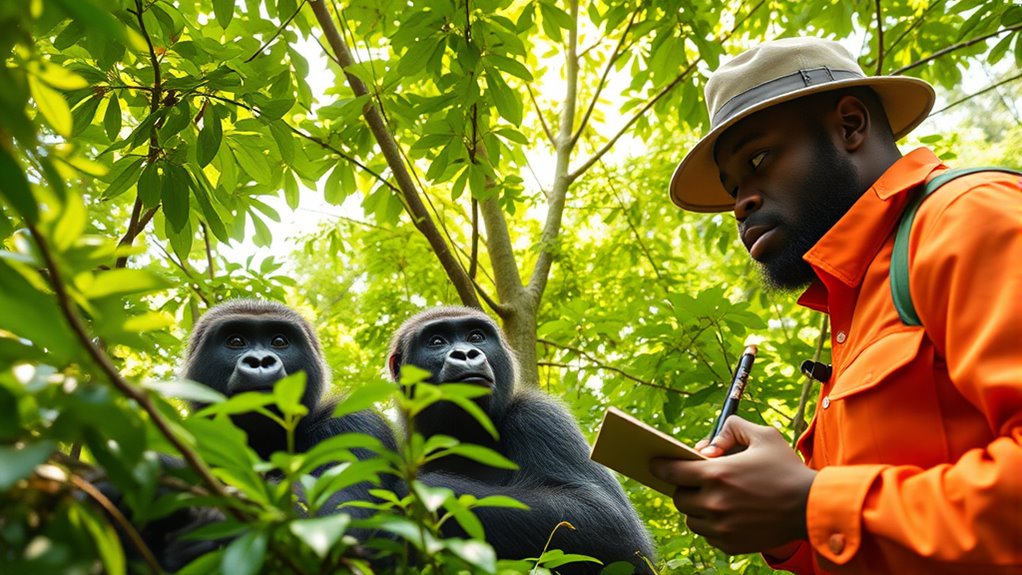
To safeguard Rwanda’s gorillas, supporters emphasize eco-friendly trekking gear and controlled visitor numbers to minimize impact. You’re encouraged to use sustainable equipment and follow guidelines that preserve the habitat. Community involvement initiatives also ensure local people benefit directly from tourism, fostering conservation efforts. Additionally, educating visitors about wildlife preservation helps promote responsible tourism practices.
Eco-Friendly Trekking Gear
Have you ever considered how your gear can impact the environment during a gorilla trek? Choosing eco-friendly gear helps conserve Rwanda’s precious habitats. Here are three ways to reduce your footprint:
- Opt for eco-friendly clothing made from sustainable materials, which minimizes pollution and supports ethical production.
- Use gear with sustainable packaging to cut down on waste and landfill contributions.
- Bring reusable water bottles and containers to avoid single-use plastics, keeping the environment pristine.
- Selecting materials like bamboo or recycled fabrics for your trekking gear can further lessen your environmental impact material sustainability.
Controlled Visitor Numbers
Implementing controlled visitor numbers is essential to ensuring gorilla populations remain healthy and habitats stay undisturbed. By managing visitor flow, park authorities protect these gentle giants and their environment. Limiting daily permits reduces stress on the gorillas and minimizes habitat disruption, promoting sustainable tourism. You can help support habitat protection through responsible visitor management, ensuring your experience doesn’t harm the wildlife.
| Visitor Numbers | Impact on Habitat |
|---|---|
| High | Habitat degradation |
| Limited | Habitat preservation |
| Overcrowding | Stress to gorillas |
| Managed visits | Ecosystem balance |
| Responsible tourism | Long-term conservation |
Controlled numbers guarantee your visit remains a positive contribution to conservation efforts.
Community Involvement Initiatives
Community involvement plays a vital role in guaranteeing the sustainability of gorilla trekking in Rwanda. By engaging local communities, you help preserve cultural heritage and promote conservation efforts. Initiatives include:
- Supporting traditional rituals that honor wildlife, fostering a sense of stewardship.
- Incorporating folklore stories into educational programs to connect communities with gorilla conservation.
- Providing employment opportunities, such as guides and artisans, that benefit locals directly.
These practices encourage respect for the environment and cultural traditions. When communities take pride in their folklore and rituals, they become active partners in conservation. Your participation in community-led initiatives ensures that gorilla tourism remains sustainable, benefiting both the environment and local livelihoods. This holistic approach helps safeguard Rwanda’s iconic mountain gorillas for future generations.
Challenges Facing Gorilla Conservation in Rwanda

Despite Rwanda’s efforts to protect its mountain gorillas, several pressing challenges threaten their survival. Habitat fragmentation from agricultural expansion and infrastructure development reduces their living space, making it harder for them to thrive. Poaching threats remain a constant danger, despite strict laws and patrols. These pressures force gorillas into smaller, isolated areas, increasing their vulnerability to disease and starvation. To understand the impact, consider this table:
| Challenge | Effect |
|---|---|
| Habitat fragmentation | Limits travel, reduces food sources |
| Poaching threats | Decreases population, risks extinction |
| Human encroachment | Disrupts natural behaviors |
Addressing these issues requires ongoing vigilance and adaptive conservation strategies.
Collaborations and International Support for Conservation
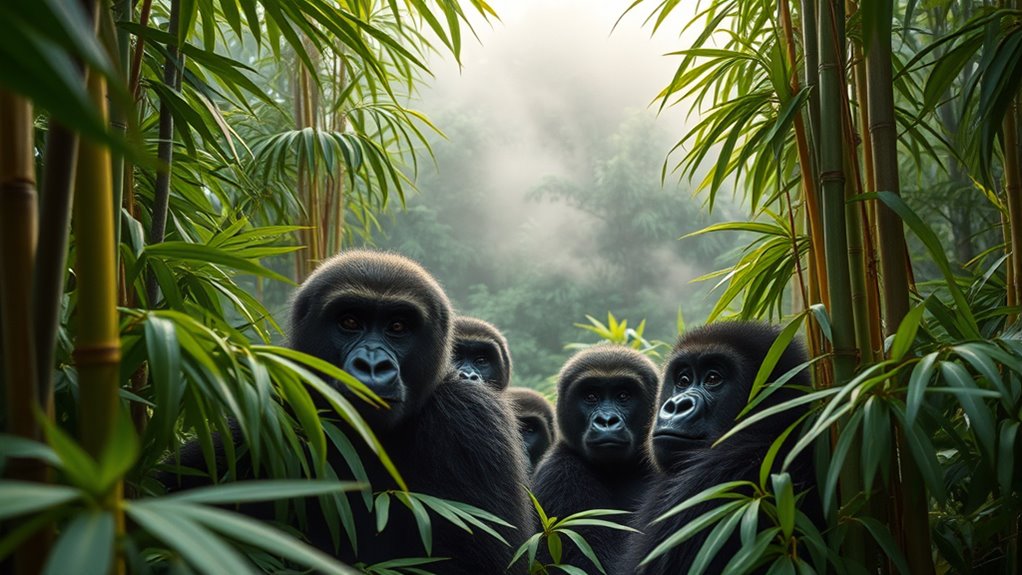
International partnerships play a crucial role in supporting Rwanda’s gorilla conservation efforts, bringing in vital expertise and resources. Funding from global organizations helps sustain essential projects, while community engagement guarantees local people benefit from conservation. These collaborations create a stronger, more sustainable approach to protecting these incredible animals.
Global Partnerships Strengthen Efforts
Global partnerships play a crucial role in strengthening Rwanda’s efforts to conserve its mountain gorillas. These collaborations help boost eco tourism and guarantee wildlife protection through shared expertise and resources. You should know that such international support leads to impactful initiatives like community engagement programs and habitat restoration. Here are three ways global partnerships make a difference:
- Funding conservation projects that protect gorilla habitats
- Promoting eco tourism as a sustainable income source for local communities
- Facilitating knowledge exchange among conservation organizations
Funding Boosts Conservation Projects
Have you ever wondered how conservation projects in Rwanda receive the necessary funding to protect its iconic mountain gorillas? International support and collaborations play a crucial role. These funds help monitor gorilla health, ensure a proper gorilla diet, and combat habitat degradation. With financial backing, organizations can implement measures that prevent deforestation and preserve critical forest corridors. This funding also supports research on how habitat changes affect gorillas and their diet, allowing for targeted conservation efforts. By boosting these projects, Rwanda can address threats like habitat loss while fostering sustainable tourism. The combined efforts of global partners ensure that resources are available to maintain healthy gorilla populations, safeguard their habitats, and promote long-term conservation success.
Community Engagement Initiatives
Community engagement initiatives are essential to sustaining Rwanda’s gorilla conservation efforts. These programs foster local support, ensuring communities benefit from eco tourism benefits and actively participate in wildlife monitoring. Your involvement can include:
- Partnering with local communities to develop sustainable eco tourism, creating economic incentives for conservation.
- Supporting educational programs that raise awareness about gorilla protection and habitat preservation.
- Promoting community-led wildlife monitoring, which helps track gorilla health and detect threats early.
Future Goals for Gorilla Preservation
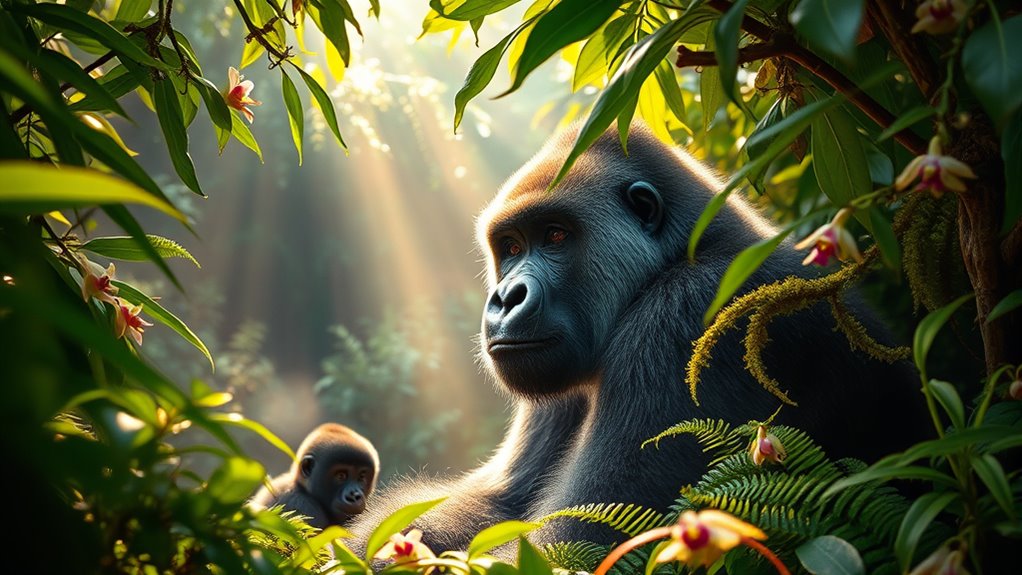
To guarantee the long-term survival of mountain gorillas, conservation efforts in Rwanda are setting ambitious future goals. One key focus is expanding and protecting gorilla habitat to ensure they have enough space to thrive. Increasing conservation funding is also critical, enabling better research, anti-poaching measures, and community support. These efforts aim to balance tourism with preservation, ensuring sustainable growth. Below is a table highlighting the main objectives:
| Goal | Action Plan |
|---|---|
| Habitat preservation | Expanding protected areas and corridors |
| Funding increase | Securing government and international support |
| Community involvement | Enhancing local engagement and benefits |
| Research and monitoring | Implementing advanced tracking and data analysis |
Tips for Responsible Gorilla Trekking Experience
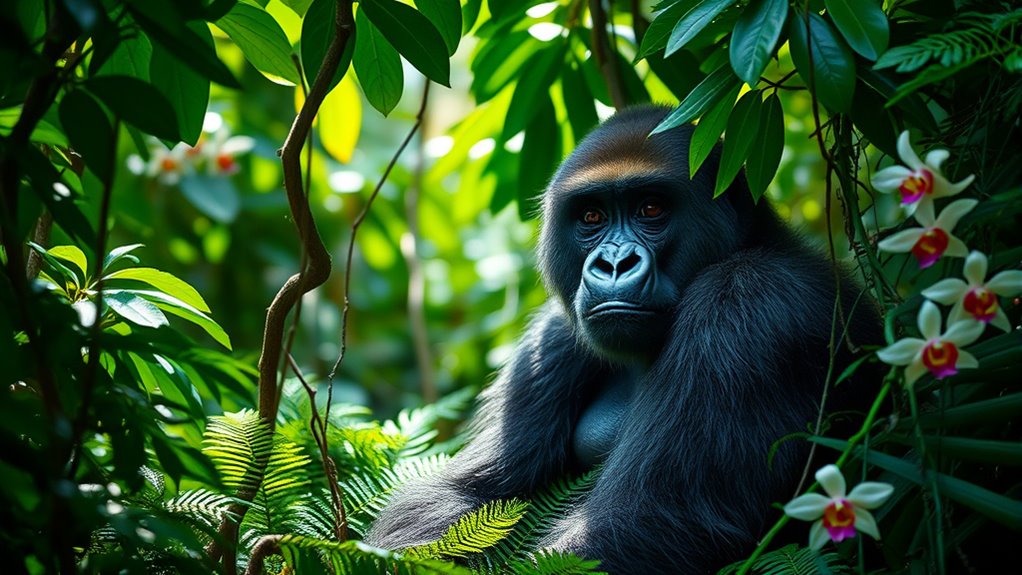
As you prepare for your gorilla trek, it’s important to remember that responsible tourism helps guarantee these incredible creatures remain protected for future generations. Respect gorilla behavior by maintaining a safe distance and avoiding sudden movements, which minimizes stress on the animals. Understanding forest ecology is key; stay on designated paths to prevent habitat disturbance and preserve the ecosystem. Here are some tips to enhance your experience:
Responsible tourism ensures gorillas are protected for future generations—respect their space and stay on designated paths.
- Keep noise levels low to avoid disrupting gorilla groups and their environment.
- Follow your guide’s instructions carefully, especially regarding camera flashes and proximity.
- Limit your group size to reduce impact and support conservation efforts.
Frequently Asked Questions
What Are the Current Costs of Rwanda’S Gorilla Trekking Permits?
You’re probably curious about the permit pricing for Rwanda’s gorilla trekking, which impacts your planning and budget. Currently, permit costs are around $1500 USD for foreign non-residents, reflecting high tourism impact and conservation efforts. These fees help protect gorillas and support local communities. While expensive, your purchase directly contributes to preserving these incredible animals and ensuring sustainable tourism. Keep in mind that prices can change, so check for the latest updates before booking.
Can Permits Be Purchased as Gifts or Souvenirs?
You might wonder if Gorilla permit gifting or souvenir permits are options, and the answer is yes. While official permits are strictly for trekking, some operators offer gift certificates or souvenir permits that make great keepsakes or unique gifts. These options let you share the excitement of gorilla trekking without actually reserving a permit, making it a memorable gesture for wildlife lovers or special occasions.
Are There Age Restrictions for Gorilla Trekking Permits?
You won’t believe how strict the age restrictions are for gorilla trekking permits—only those aged 15 and above are eligible to participate. This rule guarantees safety and conservation, so permit eligibility is limited to teenagers and adults. If you’re planning a trip, make sure to verify these age restrictions early. It’s a rare adventure that requires maturity and respect for the incredible wildlife you’re about to encounter.
How Do Permits Affect the Local Economy Beyond Conservation?
Permits boost the local economy by encouraging community empowerment and increasing tourism revenue. When you purchase a permit, you’re supporting local communities through employment opportunities, local crafts, and hospitality services. This influx of tourism funds helps improve infrastructure and social services, benefiting everyone. By participating, you contribute directly to economic growth, ensuring communities thrive alongside conservation efforts, and fostering a sustainable future for the region.
What Are the Penalties for Violating Gorilla Trekking Rules?
Ever wondered what happens if you break gorilla trekking rules? Violating these rules can lead to hefty fines, imprisonment, or both, ensuring protection for these endangered animals. It’s essential to respect ethical considerations and community involvement efforts, which help sustain gorilla populations and local livelihoods. Do you realize how your actions impact conservation? Following guidelines not only safeguards gorillas but also supports local communities and preservation initiatives.
Conclusion
By securing a permit, you become a essential part of Rwanda’s lush, thriving sanctuary where gentle giants thrive amidst vibrant greenery. Your responsible visit helps nurture their peaceful haven, ensuring future generations can marvel at these majestic creatures. With each trek, you weave a delicate thread into the fabric of conservation, balancing adventure with care. Together, we can keep this green paradise vibrant and resilient, allowing nature’s masterpiece to flourish for years to come.

